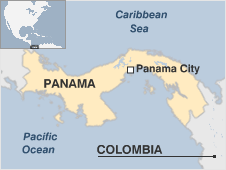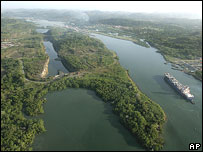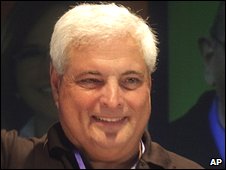 |
Lying at the crossroads of the North and South American continents and
the Atlantic and Pacific oceans Panama is of immense strategic importance.
This has made it a target for intervention by the US which in 1989 invaded Panama to depose a former ally Manuel Noriega and until 1999 controlled the Panama Canal.
Panama has the largest rainforest in the Western Hemisphere outside the Amazon Basin and its jungle is home to an abundance of tropical plants animals and birds - some of them to be found nowhere else in the world.
Overview
However it is for a feat of engineering a canal connecting the Atlantic and Pacific oceans that Panama is famous. Every year hundreds of thousands of people make the eight-hour journey through the waterway and it generates a proportion of the country's GDP.

The Panama canal is a conduit for global cargo
|
Panama is widening the canal which is more than 90 years old and operating almost at full capacity to allow it to handle more and larger vessels. Work on the scheme which was approved in a referendum in 2006 began in September 2007.
Offshore finance manufacturing and a shipping registry generate jobs and tax revenues. Panama's services-based economy also benefits from the Colon free trade zone home to some 2000 companies and the second largest in the world. A free trade agreement with the US was reached in late 2006.
Bananas are the main cash crop but the trade has been hit by disease and is vulnerable to tariff changes in the European export market.
Panama faces the challenge of shaking off its reputation as a major transit point for US-bound drugs and illegal immigrants and as a haven for money-laundering.
It also needs to address social inequality. Elite families of European descent control most of Panama's wealth and power while about 40% of the population live below the poverty line.
The canal the natural attractions of its pristine forests and coastlines and a lively modern capital are fuelling a growing tourism industry.
Facts
- Full name: Republic of Panama
- Population: 3.5 million (UN 2009)
- Capital: Panama City
- Area: 75517 sq km (29157 sq miles)
- Major languages: Spanish English
- Major religion: Christianity
- Life expectancy: 73 years (men) 78 years (women) (UN)
- Monetary unit: 1 balboa = 100 cents
- Main exports: Bananas fish shrimp petroleum products
- GNI per capita: US $6180 (World Bank 2008)
- Internet domain: .pa
- International dialling code: +507
Leaders
President: Ricardo Martinelli
Conservative supermarket magnate Ricardo Martinelli was elected to succeed Martin Torrijos with a landslide victory at the April 2009 presidential election.

Mr Martinelli's business credentials drew voters worried by slowing growth
|
Standing for the four-party opposition Alliance for Change Mr Martinelli gained 61% of vote against 37% for Balbina Herrera the candidate of the governing left-wing Democratic Revolutionary Party.
The result appeared to run counter a wider Latin American trend towards the left.
With Panama's recent rapid rate of economic growth slowing as a result of the global economic slump Mr Martinelli's business background attracted many voters fearful about job losses.
The previous government was blamed for rising crime and a surge in prices and Mr Martinelli tapped into feelings that little had been done to spread the wealth created in the economic boom to low-income Panamanians.
During the campaign he promised to promote free trade especially with the US Panama's biggest trading partner and to encourage foreign investment.
Among his proposals were a flat income tax of between 10% and 20% to draw investors to the country as well as an ambitious public works programme.
He also promised to forge ahead with a $5.25bn expansion plan for the Panama Canal the country's main engine for economic growth.
Mr Martinelli was born in 1952 in Panama City and has a degree from the University of Arkansas. Apart from owning the Super 99 supermarket chain he has interests in several other businesses including banks and agricultural firms.
He is the leader of the Democratic Change party founded in 1998 and unsuccessfully stood for president in 2004.
Media
Panama's media are free to present news and comment. Laws which penalised "insults" against state officials were repealed in 2005.
Media rights organisation Reporters Without Borders noted in 2006 that political stability had stimulated the growth of "free and vigorous" media.
Broadcasting is dominated by the private sector. Corporacion Medcom operates the two most-popular TV networks. There are around 100 radio stations and several other TV networks.
The press
- La Prensa - daily broadsheet
- El Siglo - daily tabloid
- La Critica Libre - daily tabloid
- El Panama America - daily
- La Estrella de Panama - daily
- Panama News - English-language
Television
- Telemetro - commercial
- RPC - commercial
- Televisora Nacional (TVN) - commercial
- FETV - educational run as charitable foundation
Radio
- RPC Radio - commercial news talk
- METO 103.5 - commercial FM
- Super Q - commercial FM
- Omega Stereo - commercial FM
-
KW Continente - mediumwave (AM) station rebroadcasts some BBC programmes
AFRICA | ASIA-PACIFIC | AMERICAS | EUROPE | MIDDLEEAST | SOUTHASIA
Mauritania Mauritius Morocco Mozambique Namibia Niger Nigeria Republic-of-congo Rwanda Sao-tome-and-principe Senegal Seychelles Sierra-leone Somalia South-africa Sudan Swaziland Tanzania The-gambia Togo Tunisia Uganda zambia Zimbabwe Australia Brunei Burma Cambodia China East-timor Fiji Indonesia Japan Kazakhstan Kiribati Kyrgyzstan Laos Malaysia Marshall-islands Micronesia Mongolia Nauru New-zealand North-korea Palau Papua-new-guinea Samoa Singapore Solomon-islands South-korea Taiwan Tajikistan Thailand The-philippines Tonga Turkmenistan Tuvalu Uzbekistan Vanuatu Vietnam Antigua-and-barbuda Argentina Bahamas Barbados Belize Bolivia Brazil Canada Chile Colombia Costa-rica Cuba Dominica Dominican-republic Ecuador El-salvador Grenada Guatemala GuyanaHaiti Honduras Jamaica Mexico Nicaragua Panama Paraguay Peru St-kitts-and-nevis St-lucia St-vincent-and-the-grenadines Suriname Trinidad-and-tobago United-states-of-america Uruguay Venezuela Albania Andorra Armenia Austria Azerbaijan Belarus Belgium Bosnia-hercegovina Bulgaria Croatia Cyprus Czech-republic Denmark Estonia Finland France Georgia Germany Greece Hungary Iceland Ireland Italy Latvia Liechtenstein Lithuania Luxembourg Macedonia Malta Moldova Monaco Montenegro Norway Poland Portugal Russia San-marino Serbia Slovakia Slovenia Spain Sweden Switzerland The-netherlands Turkey Ukraine United-kingdom Vatican Algeria Egypt Iran Iraq Israel-and-palestinian-territories Jordan Kuwait Lebanon Libya Mauritania Oman Saudi-arabia Sudan Syria Tunisia United-arab-emirates Yemen Afghanistan Bangladesh Bhutan India Nepal Pakistan Sri-Lanka The-Maldives

